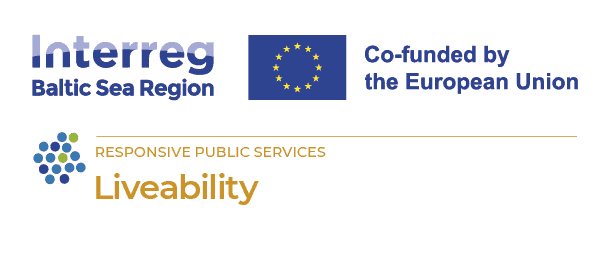
Launch of the Twinning Programme: Online Kick-Off Event
17 December 2024
The event brought together cities from the Baltic Sea Region (BSR) to share ideas and explore practical approaches to improving urban quality of life through the Liveability Design Approach (LDA).
Twinning Programme: Partner Cities and Twin Cities
The Twinning Programme pairs the six Partner Cities with selected Twin Cities across the BSR, fostering knowledge exchange and collaboration on shared urban challenges. The six twinning pairs are:
- Kiel (DE) – Umeå (SE)
- Riga (LV) – Vilnius (LT)
- Kolding (DK) – Göteborg (SE)
- Gdynia (PL) – Krosno (PL)
- Guldborgsund (DK) – Liepāja (LV)
- Pori (FI) – Mänttä-Vilppula (FI)
Each pair will collaborate to exchange experiences, pilot innovative projects, and develop strategies to address urban challenges together.
Introduction to the Liveability Project
Following the opening session, participants were introduced to the objectives and tools of the Liveability Project. The project aims to enhance urban liveability in cities across the Baltic Sea Region through participatory and innovative design approaches. At its centre lies the Liveability Design Approach (LDA), which provides cities with practical frameworks to address challenges collaboratively and effectively. The LDA is built on three key components:
- Charter for Designing a Liveable City: A set of guidelines for integrating participatory design (PID) into city strategies and practices.
- Training Programme: A capacity-building initiative to equip city employees with skills to apply design methods in daily operations.
- Practice Guide: Practical advice for developing neighbourhood projects and addressing specific urban issues through design-based methods.
The Twinning Programme will apply these tools to real-life challenges, fostering collaboration among cities to co-create solutions and make urban spaces more liveable.
Twin City Presentations
Representatives from five of the six twin pairs (with the exception of Liepāja) shared their priorities, challenges, and areas of focus during the event:
- Göteborg & Kolding: Empowering citizens – especially youth – to drive urban regeneration by revitalizing empty city centers and improving public spaces in peripheral areas.
- Umeå & Kiel: Addressing trust, social capital, and creating inclusive meeting spaces for seniors.
- Mänttä-Vilppula & Pori: Revitalizing city centres through cultural initiatives to attract residents and artists.
- Vilnius & Riga: Strengthening community life, implementing the 15-minute city concept, and engaging citizens in designing public spaces.
- Krosno & Gdynia: Developing community centres and exploring ways to integrate refugees in border areas.
Reflections and Next Steps
The kick-off event provided a valuable platform for cities to connect, exchange insights, and identify common ground for collaboration. While the discussions revealed promising approaches, much of the work lies ahead. Key next steps include:
- Organizing study visits between paired cities to deepen collaboration and share best practices.
- Launching pilot projects to test innovative solutions in real-world contexts.
- Continuing the exchange of knowledge and ideas to foster meaningful progress toward more liveable cities.
The event was moderated by the Baltic Sea Cultural Center, which, in collaboration with the Gdansk University of Technology and the project lead team, is responsible for overseeing and implementing the Twinning Programme. They thanked all participants for their active engagement and contributions. The team looks forward to the next phases of the programme, where cities will work together to turn shared ideas into tangible improvements for urban life across the Baltic Sea Region.





